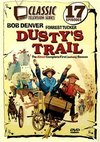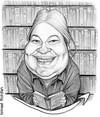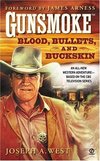 The Wall Street Journal profiles Amazon’s #1 reviewer, a woman of exceptional taste in literature…as well as beauty, poise, wit and charm. I’ve never met the woman, but I sensed all those things about her from her reviews of my books.
The Wall Street Journal profiles Amazon’s #1 reviewer, a woman of exceptional taste in literature…as well as beauty, poise, wit and charm. I’ve never met the woman, but I sensed all those things about her from her reviews of my books.
My Blog
Our Trip – Day Five
Today we spent money… Valerie & Maddie on Indian jewelry in Old Town and I, of course, bought books, going crazy at Albuquerque’s wonderful Page One Bookstore. I left after three hours of browsing with a bunch of signed first editions mysteries, used westerns (by Bill Crider, Ed Gorman, Robert Vaughn, Joseph West, and James Reasoner) and hard-to-find books by Andrew Coburn and Robert Sims Reid. I had a great time. It’s a good thing Page One isn’t in L.A. or I’d go broke…
Our Trip – Day Four
We started our day by taking the aerial tramway up to Sandia Peak, where we took in the breathtaking views and lobbed snowballs at each other. Afterwards, we went into Santa Fe where we strolled through the Plaza. We bought jewelry and moccasins for Maddie, a book and a cowboy hat for me (to wear while I read all the westerns I bought in Flagstaff), and some jewelry for Valerie. We returned to Albuquerque just in time for a wonderful dinner with my friends authors Aimee & David Thurlo, followed by dessert at their house in Corrales, where they plied us with fantastic sugar cookies (from a hundred year old recipe) and introduced Maddie to their horse, their dogs, and their pet rats. David says the rats actually gnaw affectionately on his fingers while he writes (he called it grooming…I still call it gnawing). To me, rats chewing on my fingers while I write is a nightmare come true, but he likes it. Hey, every author has their own unique way of motivating themselves. I’m sure there are some authors who use leeches. Tomorrow, we plan on bumming around Albuquerque and visiting Page One books. On Wednesday, we head back westward to Sedona, AZ and lunch with author Richard S. Prather, one of my childhood idols.
Approaching a Tie-In
It looks like I am about to take on another series of TV tie-in novels (in addition to the continuing series of DIAGNOSIS MURDER novels). Since this isn’t a series I created, I’m considering some basic issues: when an author writes books based on a TV series, what are his main responsibilities? Is it to capture the essense of the characters and the tone of
the show… to make the book as close to an episode as possible? Or is it create a book that stands alone as a novel in its own right…while still evoking the flavor, the characters, and the "mythology" of the TV series? How flexible are you about adding elements, and making changes, to the characters and the "franchise" to suit your own needs as a novelist?
For me, I think my responsibility is to be true to the series…to the characters and voice of
the show…but to go beyond that, creating an experience that’s deeper and more satisfying than an
episode would be.
I think my first DIAGNOSIS MURDER book, for example, is the weakest because it too closely resembles an episode of the series in structure, pacing, and tone. I’ve tried in the subsequent books (seven so far) to stay true to the series…but go to places, emotional and geographical, that an episode never could. I try to dig deeper into the characters and their motivations without violating what we already know about who they are…and, if possible, shed
light on aspects of their personalities that were never revealed before. I don’t want to write episodes in book-form…but books that satisfy the reader in the same way an episode of the show could…and then offer something more lasting. I want the books to work first,
and foremost, as books… I want to write them in a way that someone who is totally unfamiliar with the TV show could pick one up and feel they’ve read a good book, not an episode of a TV show in book-form.
The advantage I have with DM is that I was the executive producer and principal writer (with William Rabkin) of the show for many years…so I knew the characters inside and out… and knew how far
I could go in new directions without violating what made the show
special. I also knew what I wanted to say, and what aspects of the characters I wanted to examine, that I *couldn’t* get away with (for a variety of reasons) on the show. It wasn’t difficult for me to capture the voices of the characters because I’d already written
literally hundreds of stories with them before.
On this new series of books, if the deal closes today, I also have the advantage of having written for these characters before (having scripted several episodes of the show) but I don’t feel that they
are mine to anywhere near the same degree as the DM characters were. Also, unlike DM, this series is still in production and is a big hit, so I have to be careful not to step on anything they are doing or might reveal about the characters down the line. Luckily, I have a
great relationship with the showrunner, and his encouragement to try new things with the "franchise" and the characters. I already know the voice I’m going to use for the book,
the point-of-view I’m going to take, which is already a big change from the TV series (and an approach the showrunner agrees with).
I’ll give you more details about the project once the deal is officially done, which will be today or tomorrow, since the deadline is brutal. I’m eager to take on the challenge… even if means writing a novel faster than I ever have before.
Our Trip – Day Three
 Last night in Flagstaff, I wandered into Bookman’s and found a bunch of used Bill Crider and Robert Vaughan westerns in fine condition. Nothing makes a trip like finding good books. This morning we left Flagstaff around 9 (after a complimentary breakfast of biscuits and gravy at the Hampton Inn) and headed east for Albuquerque. Along the way, we took a peek at the famous La Posada Hotel in Winslow AZ (a desolate, decaying, modern-day ghost town), made the obligatory photo-opportunity stop at the Wigwam Motel in Holbrook (that’s my wife Valerie and my daughter Maddie in the photo, which you can click to enlarge) and toured the Petrified Forest National Park. We stopped for lunch at the El Rancho Hotel in Gallup, New Mexico and made it to Albuquerque by 5:30 for a sunset stroll through Old Town, which was closed and deserted for Easter. Tomorrow,we’re planning on revisiting Old Town, taking the aerial tramway up to the snow and having dinner with my friends Aimee & David Thurlo, authors of the Ella Clah novels.
Last night in Flagstaff, I wandered into Bookman’s and found a bunch of used Bill Crider and Robert Vaughan westerns in fine condition. Nothing makes a trip like finding good books. This morning we left Flagstaff around 9 (after a complimentary breakfast of biscuits and gravy at the Hampton Inn) and headed east for Albuquerque. Along the way, we took a peek at the famous La Posada Hotel in Winslow AZ (a desolate, decaying, modern-day ghost town), made the obligatory photo-opportunity stop at the Wigwam Motel in Holbrook (that’s my wife Valerie and my daughter Maddie in the photo, which you can click to enlarge) and toured the Petrified Forest National Park. We stopped for lunch at the El Rancho Hotel in Gallup, New Mexico and made it to Albuquerque by 5:30 for a sunset stroll through Old Town, which was closed and deserted for Easter. Tomorrow,we’re planning on revisiting Old Town, taking the aerial tramway up to the snow and having dinner with my friends Aimee & David Thurlo, authors of the Ella Clah novels.
Our Trip – Day Two
 I’m on-the-road with my family, driving from L.A. to Santa Fe. Tonight, I’m writing to you from the lobby of Hampton Inn in Flagstaff, AZ. Yesterday, we drove along a narrow, twisting, forgotten stretch of Route 66 through Oatman, an old mining town, where wild burros roam freely down the dusty main drag. Here’s the weird thing: a good chunk of the DIAGNOSIS MURDER novel I turned in last month takes place in Oatman and on that stretch of Route 66…which I described without ever having been there. It turns out that what I "imagined" was pretty close to the reality. Who says you can’t just make things up? On the way out of Oatman, we visited a gold mine (my daughter loved it) and spent the evening in snowy Williams. This morning, we headed out to the Grand Canyon under cloudless, bright blue skies….then drove into Flagstaff on Hwy 189 through snow-covered woods. We had the road almost to ourselves and stopped along the way for a snowball fight. Tomorrow, we set out for Gallup, NM with stops at the Petrified Forest and the Meteor Crater. (Click on the photo for a larger image)
I’m on-the-road with my family, driving from L.A. to Santa Fe. Tonight, I’m writing to you from the lobby of Hampton Inn in Flagstaff, AZ. Yesterday, we drove along a narrow, twisting, forgotten stretch of Route 66 through Oatman, an old mining town, where wild burros roam freely down the dusty main drag. Here’s the weird thing: a good chunk of the DIAGNOSIS MURDER novel I turned in last month takes place in Oatman and on that stretch of Route 66…which I described without ever having been there. It turns out that what I "imagined" was pretty close to the reality. Who says you can’t just make things up? On the way out of Oatman, we visited a gold mine (my daughter loved it) and spent the evening in snowy Williams. This morning, we headed out to the Grand Canyon under cloudless, bright blue skies….then drove into Flagstaff on Hwy 189 through snow-covered woods. We had the road almost to ourselves and stopped along the way for a snowball fight. Tomorrow, we set out for Gallup, NM with stops at the Petrified Forest and the Meteor Crater. (Click on the photo for a larger image)
Dusty’s Trail
It’s amazing what you can find on DVD nowadays… you can own the complete series of DUSTY’S TRAIL, all 21 abysmal half-hour episodes of the 1973 syndicated sitcom starring Bob Denver, for just $10 ($4.99 for the 17 episode set plus $4.99 for a seperately released DVD with the first four episodes).
DUSTY’S TRAIL was a frontier rip-off of GILLIGAN’S ISLAND, about a wagon train lost in the west. Forrest Tucker took on the "Skipper" role while Denver basically played Gilligan all over again. They even had a wealthy guy and his wife, a showgirl and.. well, you get the picture. Sherwood Schwartz, the creator/exec producer of GILLIGAN, was the comedic mastermind behind this one as well.
Being a TV geek, I can’t get over the idea that I can own an entire series, even a crappy one, for ten bucks. The mind boggles at what other complete packages of short-lived, obscure series might show up on DVD.
Already I own on DVD the complete series of NERO WOLFE, the original STAR TREK, the British series COUPLING and KAVANAGH QC… as well as seasons of ALL IN THE FAMILY, GREATEST AMERICAN HERO, CRIME STORY, THE SHIELD, UFO, NIP/TUCK, SEINFELD, MARY TYLER MOORE, SPACE 1999, ARRESTED DEVELOPMENT, SOPRANOS, DEADWOOD, BOOMTOWN, I SPY, MONK, SLIDERS, COLUMBO, EVERYBODY LOVES RAYMOND, DICK VAN DYKE SHOW, and MAGNUM PI. Granted, those shows cost more than $10, but still… I own them. For a guy who has every TV Guide that’s come into his hands since 1970, this is a big deal.
Now if you will excuse me, I have to go light some candles and kneel in front of my poster of Heather Locklear.
At Least One Guy is Reading POD Books
I found a blog dedicated to reviewing vanity press novels. That’s right, all that PublishAmerica, iUniverse, POD stuff. And no, some cruel Judge didn’t order him to do it as "community service" to work off an indecent exposure conviction. So how can he endure it?
I expect nothing. And, in fact, I get
nothing the far majority of the time. But every now and then I stumble
across a winner, a book so compelling and well-written that I feel the
need to immediately call my friends and share. And the fruit, my
friends, is that much sweeter.
Road Trip
Things may be very slow here next week… on Friday, my wife and daughter and I are heading out on our first family roadtrip, driving from LA to Santa Fe and back… stopping at the Grand Canyon, Sedona, and who-knows-where. If I may post some dispatches from the road otherwise, if I survive, you’ll find me back here around April 4th.
Gunsmoke Novel
 I devoured Joseph West’s new GUNSMOKE tie-in today. It wasn’t just
I devoured Joseph West’s new GUNSMOKE tie-in today. It wasn’t just
a great TV tie-in…it was a great western that stood tall on its own. Not only did
West capture the characters and tone of the series perfectly, he went much
deeper, adding vivid details about life in Dodge and the politics of the job. There was
also some wonderful prose… particularly when it came to describing the
landscape and frontier life. If you’re a fan of the series (as I am), or are just a-itchin’ for a good read, grab yerself a copy of this rip-snortin’ tale lickety split (aren’t you glad I’m not writing westerns?)




